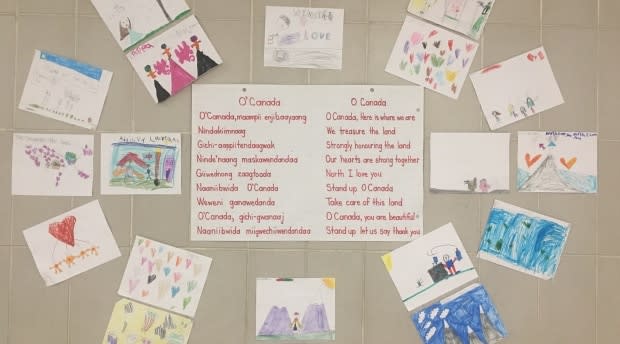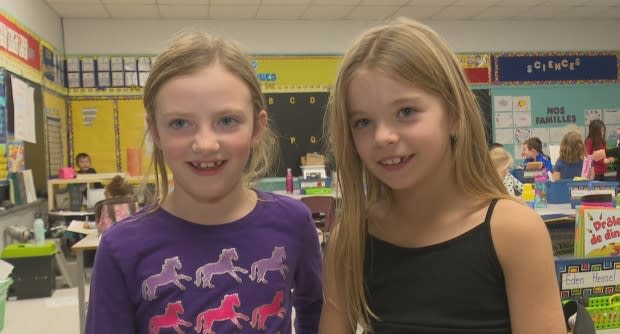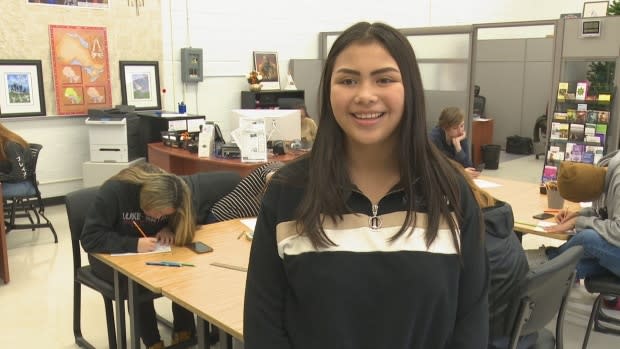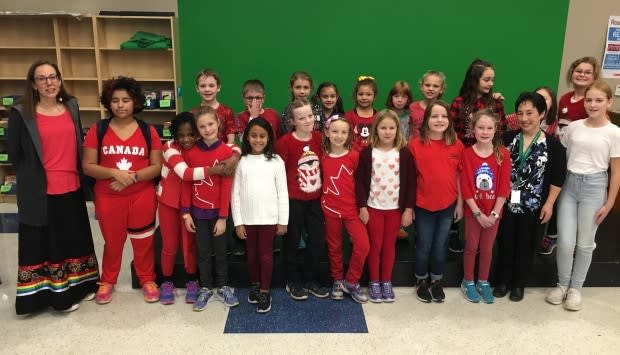Students in southwestern Ontario are singing 'O Canada' in Ojibwe

While most schools across the country begin their days with the singing of the national anthem in English or French, some students in Southwestern Ontario are learning the anthem a different way.
At McNaughton Avenue Public School in Chatham, Ont., students have been singing O Canada in the Ojibwe language — and it all started in Beth Gellner's Grade 2 classroom.
"We took a look at the national anthem to see, what's the difference in thinking?" she explained.
After participating in an in-depth Indigenous training course, which included field trips to nearby First Nations as well as studying the Truth and Reconciliation Commission, Gellner was determined to fold that into her teaching on a daily basis.
That's when she decided to teach her students how to sing the national anthem in Ojibwe.
Understanding the meaning behind the words
For help, she turned to Gretchen Sands-Gamble, the elementary Indigenous education special projects teacher with the Lambton Kent District School Board (LKDSB), who is from Walpole Island First Nation.

Sands-Gamble explained that the Ojibwe translation has a different meaning when compared to the English and French versions of the anthem.
"When you read the lyrics as they're translated from Ojibwe to English, you will notice that there is a lot of focus on loving the land and loving creation and honouring all of creation," she said.
"And that was something that I made sure to talk about with the students ... that world view that all of creation is important and that we as Indigenous people recognize that."
The learning process for the kids included creating drawings based on the discussions around the meaning of the anthem.

"There's lots of hearts ... because it talks of love," Gellner explained.
"And lots of mountains because it talks of the North."
Making the experience even more personal for Sands-Gamble, the version of O Canada that she's been using to teach the students is from an old recording of the late Ellen Sands from Walpole Island First Nation, who is a distant relative of hers.
She says she found the recording on an old cassette tape at her parents' house years ago.
In addition to listening to the music and teaching the students the anthem, Sands-Gamble also brought in a hand-made drum which the students sang along with. She also had them talk about promises that they could make to the land, like taking care of the water, not littering, picking up garbage and not taking more than they need.
'I wouldn't have done it without her'
"It was wonderful." Gellner said.
"I wouldn't have done it without her."

And the experience resonated with students.
"I like it a lot because it's a new language for me," said Grade 2 student Abbey Killingsworth.
Classmate Eden Hessel said she enjoyed learning something that was "different."
"My favourite part is 'Naaniibwida miigwechiiwendandaa,' and that means, 'Stand up, let us say thank you,'" she said.
A choir is formed
While it all started with the Grade 2 students, the Ojibwe language version of the anthem is now spreading throughout the school.
Prior to Gellner's decision to teach her students, the school had only ever played the anthem in English and French. She explained that's because the school doesn't have a large number of First Nations students, but added that the anthem is still important to the region.
"People around here — this is their territory — speak Ojibwe. So we should have it."

Gellner even formed a choir made up of some of her former students in upper grades, and taught them the anthem as well.
They then put together a video of the choir singing the anthem in Ojibwe. That recording is now being used during morning video announcements throughout the school, on rotation.
Empowering for the community
Sands-Gamble said hearing the anthem in Ojibwe means a lot to her, as well as to others from nearby First Nations.
"It's so important and empowering for students to hear their language and their stories and perspectives shared in the school."

McNaughton Ave. Public School isn't the only school turning to Indigenous versions of O Canada, however. Sands-Gamble has already been getting calls from other teachers throughout the region to help them learn the anthem in Ojibwe as well.
Furthermore, since she started working with the board last year, she's distributed the Ellen Sands recording of the anthem to schools across the LKDSB for them to play if they so choose.
Sands-Gamble added that public schools in Ridgetown, Ont. have been singing the anthem in the Lenaapé language too.
"I think that all the schools are starting to catch on to say, this has value," she said.
Meanwhile, some schools that are part of the St. Clair Catholic School Board in the same part of the province also play the anthem in Ojibwe, though there's no formal system of rotation.
Some have played the anthem in Ojibwe for years
Some schools in the region with large Indigenous populations — like Wallaceburg District Secondary School near Walpole Island First Nation — have been playing an Ojibwe-language version of the anthem for years.

Indigenous students at Wallaceburg Secondary said it means a lot to them to hear that version of anthem.
"It makes me feel like they're not forgetting about our culture and who we are as people," said Grade 11 student Tymmiecka Johnson-Greenbird.
"We speak that language too," said Savannah Byerly, a Grade 9 student at Wallaceburg Secondary.
"I think that's really nice of them, to just consider us."

At McNaughton Avenue, Gellner said the days the kids get to sing the national anthem in Ojibwe are their favourites.
"If I mess up, the kids are on me," she said.
"'No Madame, it's Ojibwe today. Ojibwe is the best!'"
Gellner said this is ultimately her training in action.
"It really makes me happy that I can do that and that I'm bringing this in and ... I'm going to continue to bring things in that are different."

